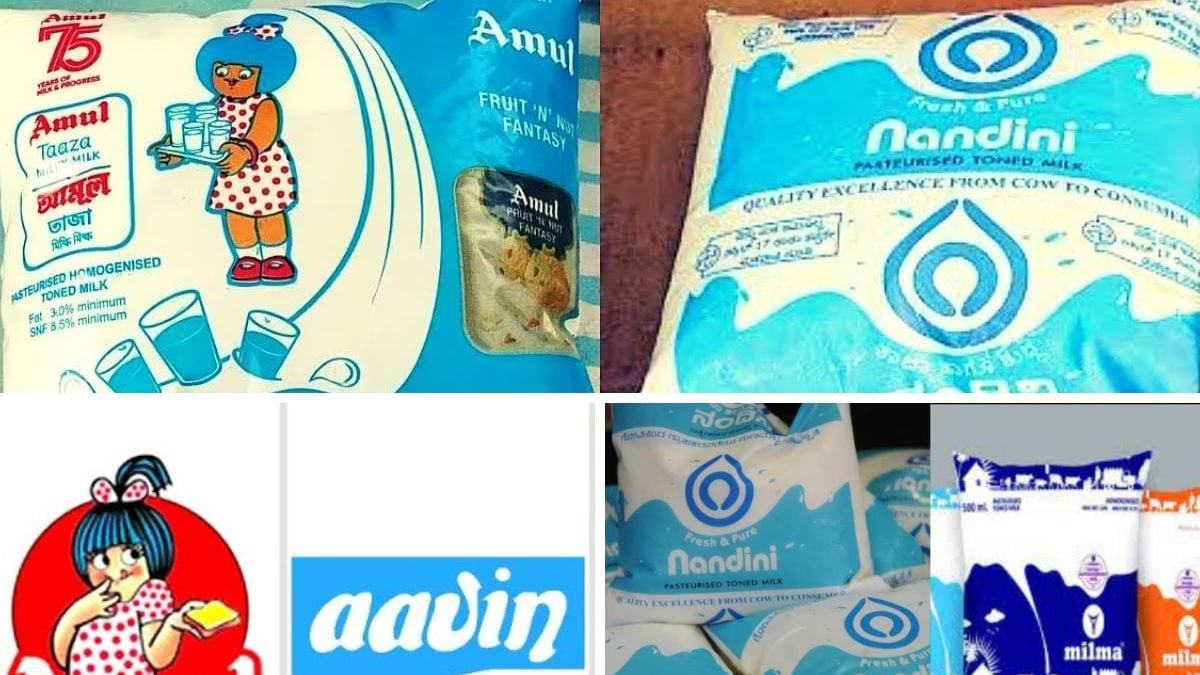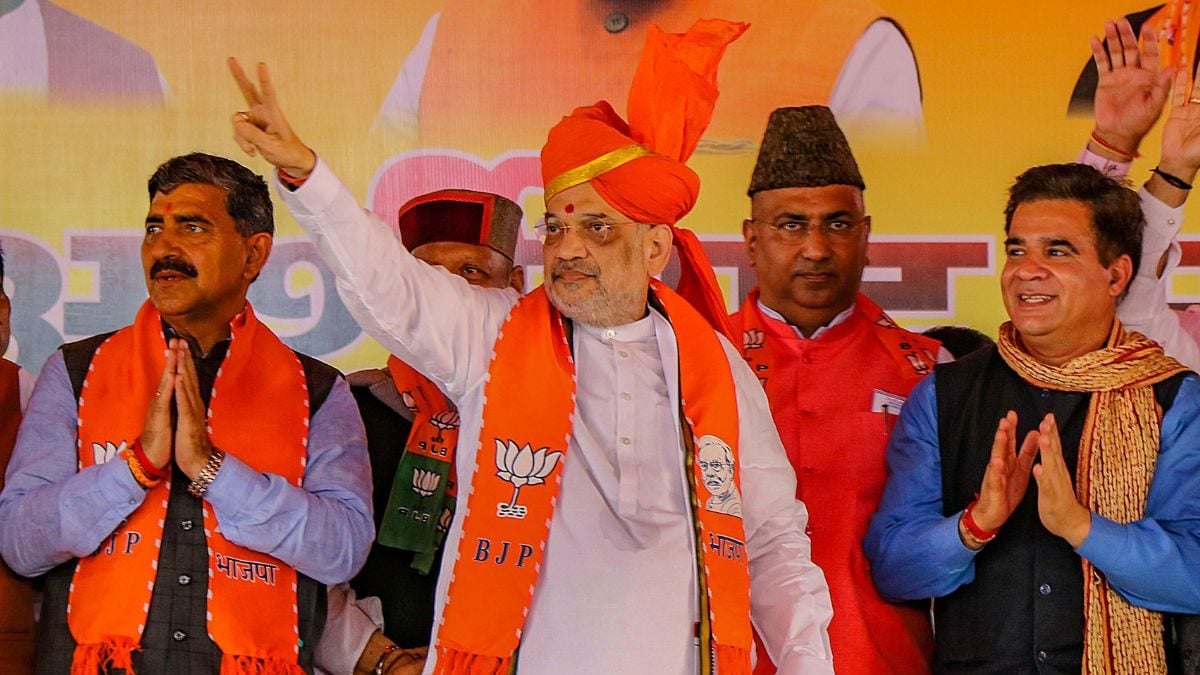[ad_1]
The southern states of Karnataka, Kerala and Tamil Nadu are in the crosshairs over the growing ‘milk wars’ in the region.
The inter-state tensions are the result of the entry of other brands, which is being opposed on the grounds of sub-national pride — be it the Amul versus Nandini in Karnataka, Aavin versus Amul in Tamil Nadu, or the latest turf war between Nandini and Kerala’s Milma.
Amid cross-marketing by milk cooperatives, the state governments have raised a red flag and warned the other of impending turf wars. Also, while the milk cooperatives of Karnataka, Kerala, Tamil Nadu and Gujarat are at loggerheads, the procurement of milk from farmers, distribution and sales have got the states sparring.
IN KERALA: STATE’s MILMA VS KARNATAKA’s NANDINI
The latest turf war is between Karnataka and Kerala. The state of Karnataka, which was up in arms against Amul to safeguard its turf, raised a controversy when its homegrown Nandini announced a plan to expand and compete in the Kerala dairy market.
The Kerala milk federation and its brand Milma has over 3,000 primary milk co-operative societies across Kerala with 15.2 lakh local milk-producing farmers as members.
The Kerala Co-operative Milk Marketing Federation (KCMMF), in a media release, said the tendency of some state milk marketing federations to “aggressively enter markets outside their respective states …..involves a total breach of cooperative spirit based on which the country’s dairy sector has been organized for the benefit of millions of dairy farmers”.
According to Milma’s chairman K S Mani, Milma passes on 83% of its turnover to its dairy farmers through cooperative societies. The Kerala government protested against the plan and called it an “unethical move”, but Nandini is said to have set up six exclusive stalls in the coastal southern state.
Mani called the move “deeply disturbing” and called out Karnataka’s stand to open Nandini stalls in Kerala as “double standards”.
“The argument that Karnataka put out when Amul entered their milk market applies to Kerala as well. How can it be any different,” asked an official from the KCMMF told News18.
The Karnataka Milk Federation (KMF) officials refused to comment on the issue.
“Some of the state dairy federations are transgressing the limits set by the sound principles and best practices of cooperative federalism. This will seriously harm the interests of dairy farmers in the country as a whole. Milma has already voiced serious concern about this tendency, which needs to be curbed with collective efforts,” explained Mani.
Milma now plans to open its outlets in Karnataka and Tamil Nadu, which they claim it is not an act of retaliation, but a marketing move to expand their businesses for the benefit of the farmers.
IN KARNATAKA: STATE’s NANDINI VERSUS GUJARAT’s AMUL
The first of the milk conflicts was between the Karnataka-based milk cooperative — Karnataka Milk Federation (KMF) — whose brand goes by the name Nandini and Gujarat-based Amul. In Karnataka, it snowballed into an election issue, giving the Congress and Bharatiya Janata Party (BJP) ammunition to target each other. The KMF’s Nandini is the second-largest dairy co-operative in India and it procures nearly 50% of all the milk supplied by the state’s farmers.
According to the statistics shared by officials, the KMF has over 2.5 million milk producer members or farmers and around 14,000 milk cooperative societies under it.
The genesis of this controversy was a statement made by Union Home Minister Amit Shah in December 2022. While inaugurating a mega dairy unit of Karnataka Milk Federation in Mandya, Shah said: “Amul and KMF together will work together towards ensuring a primary dairy in every village of the state…In 47 years, Karnataka has progressed in the dairy sector and the turnover has increased from Rs 4 crore to Rs 25,000 crore. Amul and KMF have to work together to boost the cooperative dairy in Karnataka.”
The then Opposition Congress and pro-Kannada groups lashed out at the then BJP-led state government for allowing Amul to sell fresh milk and curd in Bengaluru. They alleged it would hurt the business of local brand Nandini.
There have been attempts to stop Amul products from being sold in Karnataka. While there was a buzz of a merger between Nandini and Amul, it was dismissed by then CM Basavaraj Bommai.
IN TAMIL NADU: STATE’s AVIN VERSUS GUJARAT’s AMUL
Soon after the Nandini-Amul row, Tamil Nadu also raised an alarm, when chief minister M K Stalin wrote to Shah, asking him to instruct Amul to stop procurement activities in TN with immediate effect.
Amul reportedly procured milk from the shed reserved for the TN-based milk cooperative Aavin and also began selling their products in the southernmost state.
Like Nandini and Milma, Aavin is Tamil Nadu’s state-run cooperative. Aavin has over 9,673 milk producers and cooperative societies functioning under it.
In another turf war, Stalin complained that his government recently discovered that Amul has been using its multi-state cooperative licence to establish chilling centres and a processing plant in the Krishnagiri district.
Tamil Nadu made it clear that the practice to allow cooperatives to thrive without infringing on each other’s milk-shed area should be kept sacrosanct.
While the states have been red-flagging each other’s move, they have also approached the Centre to find a solution to avoid further turf infringements, it is learnt.
[ad_2]
Source link





